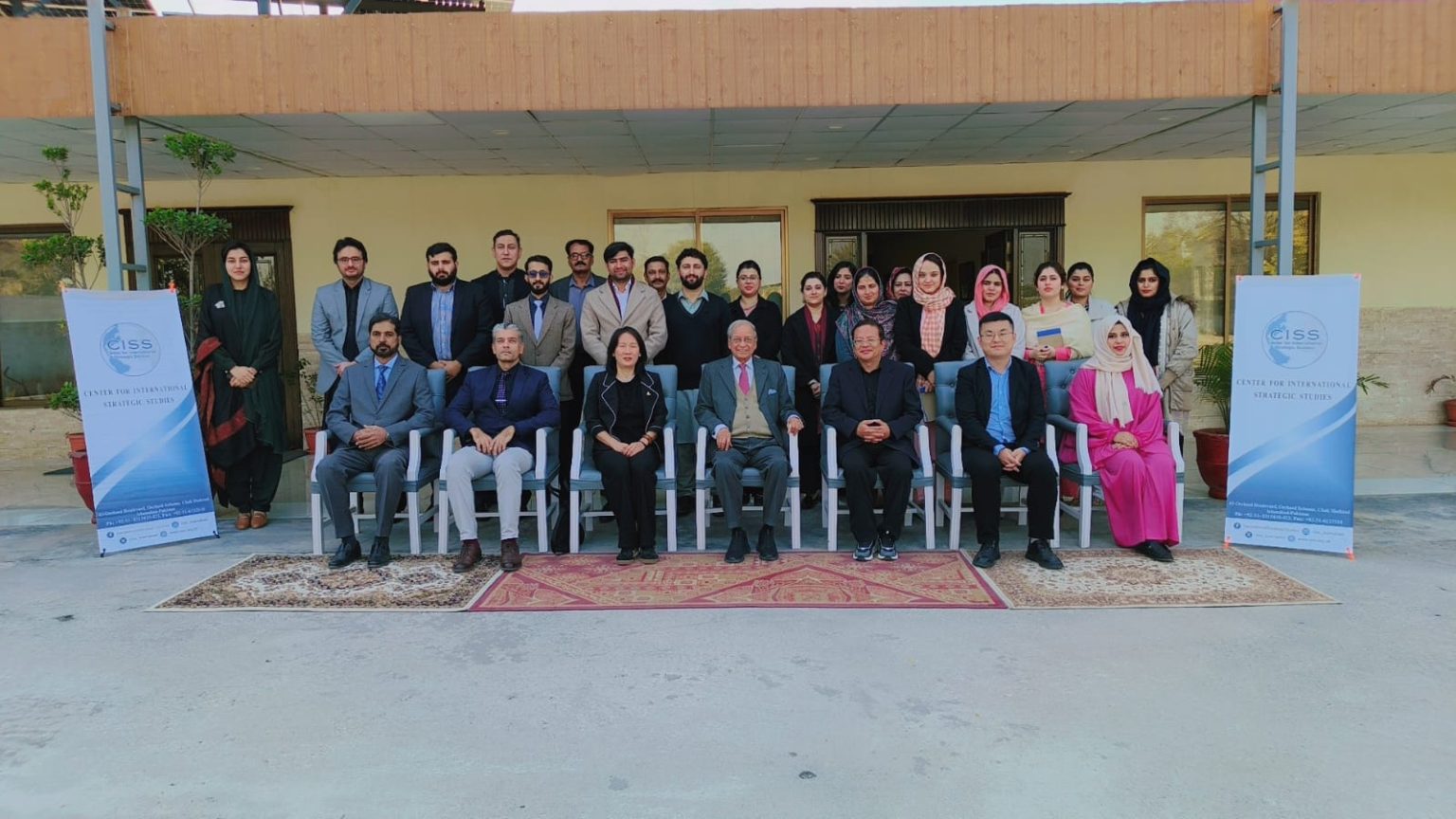Press Release
A three-member delegation from China’s premiere thinktank visited the Center for International Strategic Studies (CISS) and held a roundtable titled “Security Situation in the Region and Pakistan-China Relations.”
Dr. Yao Jinxiang, Assistant Research Fellow at CIIS, said that the US President-elect Donald Trump will increase tariffs on Chinese companies when he enters office. This will hinder Chinese businesses in Middle East, Latin America, South and Southeast Asia. It will also impact developing countries as well as BRICS.
While emphasizing the important role of BRICS, he said that the economic bloc provides strong support to China amidst of great power competition. He added that the BRICS can contribute effectively in the changing global order. He also stated that Pakistan serves as a bridge in the new BRICS system between East Asia and the Middle East. If Pakistan becomes part of BRICS, it will be immensely beneficial for Pakistan and for the broader framework of BRICS. Dr. Jinxiang also highlighted the uniqueness of China-Pakistan friendship while comparing it to other countries.
Dr. Wang Youming, Senior Research Fellow at CIIS praised Pakistan as China’s best friends. He said that the current world order is going towards disorder due to evolving conflicts and the failure of existing international bodies to fairly deal with the states. He discussed that President Xi Jinping is focusing more on multilateral organizations including BRICS and the Global South. Further highlighting Pakistan’s case for BRICS membership, he stated that evolving geopolitical realities are hindering Pakistan’s membership including India’s lack of support for it. He also lauded Pakistan’s efforts in combating terrorism to protect Chinese nationals is Pakistan especially when CPEC enters its second phase.
Dr. Li Qingyan, Associate Research Fellow at CIIS stated that in the evolving geopolitical and geo-economic landscape, South Asia has become the epicenter of world politics. She noted that India’s pro-Western policy orientation and its deepening ties with the United States have significant implications for regional stability, particularly in the context of its competition with Pakistan and its influence on Afghanistan. She further highlighted the challenges posed by infrastructural contradictions and geopolitical rivalries, which hinder regional connectivity and economic progress.
Dr. Li emphasized the importance of embracing high-quality industrial development and AI technologies to modernize the region and unlock its economic potential. She also called for greater regional cooperation, particularly in energy transformation, to mitigate conflicts and foster sustainable development. She said that the second phase of CPEC will focus on cooperation and joint research in the fields of Artificial Intelligence and emerging technologies between Pakistan and China.
Executive Director of CISS, Ambassador Ali Sarwar Naqvi, lauded China’s emergence as the only global power which has committed to cooperation over confrontation. He highlighted Pakistan’s historic ties with China, noting that Pakistan was one of the first countries to recognize the People’s Republic of China (PRC). Ambassador Naqvi underscored China’s peaceful approach to global engagement through initiatives such as the Belt and Road Initiative (BRI), the Global Development Initiative (GDI), the Global Security Initiative (GSI) among others. He stressed that China has a pivotal role to play in addressing the risks of potential conflicts in the region, advocating collaboration to promote stability and peace.
Director Research at CISS Islamabad, Dr. Bilal Zubair, said that the increasing competition between China and the United States is a challenge for regional countries, including Pakistan. While Pakistan values its close friendship with China, it also seeks to maintain positive relations with other global powers. Striking this balance is challenging in a landscape where great power competition generates uncertainties. He also identified that unlike the original Cold War, where states were compelled to choose sides, the modern era is defined by interdependence among nations. This makes it even more difficult for countries like Pakistan to align strictly with one side in this emerging global rivalry.
The discussion reflected upon all-weather China-Pakistan strategic partnership and explored more avenues of cooperation to deepen it further in the evolving global and regional security dynamics. Chinese participation further enriched the discussion on the evolving regional security dynamics and the enduring strength of Pakistan-China relations. CISS and CIIS further underscored the need to enhance partnership for joint collaboration.

